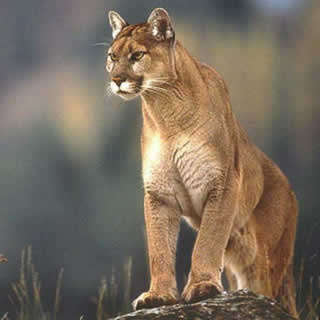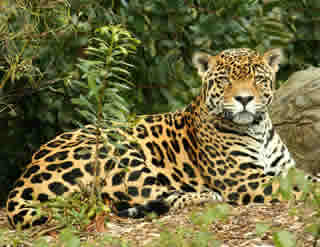Difference between Puma and Jaguar
Key Difference: Puma and Jaguar are totally different in appearance and features. One can easily recognize the big cats. Puma sizes vary according to their habitat, and are mainly found near the mountain areas. Jaguars are larger and stockier, and are mainly found in the Western hemisphere.
 Pumas belong to the Puma concolor species and genus. Puma is also known as a cougar or a mountain lion. They are huge wild cats, and run at great speeds. They are usually tan colored, and are 9ft tall. They are mainly seen in places such as the west coast of Canada, in the western half of the United States, including Alaska and Florida, and most of Central and South America. The puma is a nocturnal hunter and hunts a large variety of prey, from deer and moose, to cattle, horses and even rodents. Pumas are the largest of all the small cats, and have a recognizable facial characteristic of a black ring reaching from the corners of the mouth and around the nose.
Pumas belong to the Puma concolor species and genus. Puma is also known as a cougar or a mountain lion. They are huge wild cats, and run at great speeds. They are usually tan colored, and are 9ft tall. They are mainly seen in places such as the west coast of Canada, in the western half of the United States, including Alaska and Florida, and most of Central and South America. The puma is a nocturnal hunter and hunts a large variety of prey, from deer and moose, to cattle, horses and even rodents. Pumas are the largest of all the small cats, and have a recognizable facial characteristic of a black ring reaching from the corners of the mouth and around the nose.
Jaguars are big felines that belong to the Panthera genus and Panthera onca speices. They are the third-largest felines, after tigers and lions and the only Panthera species that is found in the Americas. They can be found in the southern United States, Mexico and across much of the Central and South America. Jaguar is the third largest cat from all the “big cats”.

Jaguars are solitary animals and live and hunt alone, except during mating season. They resemble leopards, but are larger and have a somewhat shorter tail. Jaguars are seen in many places ranging from Southern Mexico to Argentina. Jaguars are outstanding swimmers and climbers. They hunt individually, often springing from trees upon tapirs, capybaras, and peccaries. They either crush or suffocate their prey or bite straight through their skulls. They also feed on fish and rabbits; some jaguars kill domestic cattle for food. About 3 and half months after mating, the female gives birth to two to four kittens.
Comparison between Puma and Jaguar:
|
|
Puma |
Jaguar |
|
Scientific Name |
Puma concolor |
Panthera onca |
|
Family |
Felidae |
Felidae |
|
Genus |
Puma |
Panthera |
|
Kingdom |
Animalia |
Animalia |
|
Phylum |
Chordata |
Chordata |
|
Class |
Mammalia |
Mammalia |
|
Order |
Carnivora |
Carnivora |
|
Habitat |
West coast of Canada, in the western half of the United States, including Alaska and Florida, and most of Central and South America. |
Southern United States and Mexico across much of Central America and south to Paraguay and northern Argentina. |
|
Cats |
Puma is the largest wild cat animal of the four cats. |
Jaguar is the third largest feline after the tiger and the lion. |
|
Size |
Puma is up to 9 feet long, although average length is 6 – 8 feet. |
Jaguar is up to 4.25 to 6.25 feet; Tail is up to 3.5 to 4.5 feet |
|
Appearance |
Pumas are yellowish animals, referring to tigers. |
Jaguars' base coat is usually tawny yellow, but can range to reddish-brown and black. |
|
Weight |
Male’s weight is 53 to 100 kg, whereas female’s weight is 29 to 64 kg. |
Weight is 56 to 96 kg, can go up to 160 kg. Females are typically 10–20% smaller than males. |
|
Hunt |
They are pure carnivores. They hunt deer, raccoons, squirrels, foxes, rabbits and skunks. |
They will either crush or suffocate a victim or bite straight through his skull. |
|
Swim |
Although it is not strongly associated with water, it can swim. |
Jaguar is a very powerful swimmer as compared to Puma. |
|
Prey |
Favorite prey is carnivores. A puma’s killing bite is inflicted at the back of the neck, head, or throat and inflicts puncture marks with their claws usually seen on the sides and underside of the prey, sometimes also shredding the prey as they hold on. |
Favorite prey is herbivores. They stalk their prey. |
|
Distinguishing differences |
They do not have rosettes on their body, except one – a hybrid animal, known as Pumapard. |
Larger and darker rosettes, thicker lines and small spots in the middle. Rounder heads, shorter and stockier limbs. Tiny black dots inside the rosettes |
Image Courtesy: thesingular.cl, gambassa.com









Add new comment